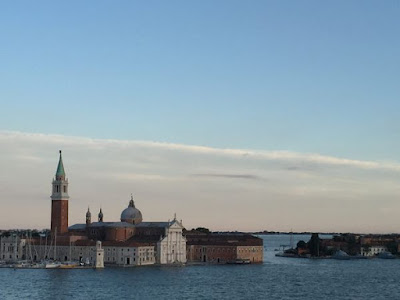"I'd never possess this city; but then I'd never had any such aspiration."
There should be a word for places that are not home but have tenets of home. Familiarity without contempt. Shall we call it "A home away"?
Venice was Joseph Brodsky's (May 24, 1940 - January 28, 1996) home away. Watermark: An Essay on Venice maps this Nobel laureate's magnificent relationship to this jeweled city.
Born in Russia in
1940, Brodsky was exiled from his country in 1972 and settled in New York. However, like John
Keats, buried in Rome, Brodsky's final resting place is Venice.
In Watermark, Brodsky gestures at the space adjacent and invites us
to sit: "Here," he lifts our chin, "This is my Venice."
The boat's slow progress through the night was like the passage of a coherent thought through the subconscious. On both sides, knee-deep in pitch-black water, stood the enormous carved chests of dark palazzi filled with unfathomable treasures—most likely gold, judging from the low-intensity yellow electric glow emerging now and then from cracks in the shutters.
The overall
feeling was mythological, cyclopic, to be precise. I entered that infinity I
beheld on the steps of the stazione and now was moving among its inhabitants,
along the bevy of dormant cyclopses reclining in the black water, now and then
raising and lowering an eyelid.
Poet Mary Oliver pushed herself to "keep attention on eternity." My singular focus on the eternal is a feeling of empathy, a warm, generous expansion into the world.
For Brodsky, it isn't the familiarity of Venice that allowed him to
expand into that infinity; it was the unknown, the anonymity.
I was standing there waiting for the only person I knew in that city to meet me. She was pretty late.
Every traveler knows this fix: this mixture of fatigue and apprehension. It's the time of staring down the clock faces and timetables, of scrutinizing varicose marble under your feet, of inhaling ammonia. [...]
Save for the yawning bartender and immobile Buddha-like matrona at
the cash register, there was no one in sight.
In this inconspicuous setting, this pause of life, what Roger Ebert called "the pastime of Being By Myself in a City Where No One Knows Who I Am and No One Knows Where to Find Me," Brodsky blends into Venice.
Through his senses, sight, touch, and smell, he becomes
"smitten by the feeling of utter happiness."
Roger Ebert, one of my favorite humans and writers, coincidentally found his anonymous self in Venice. In his memoirs, the film critic takes us there:
"In Venice, there is a small bridge leading over a side canal. Halfway up the steps crossing the bridge, there is a landing, and a little café has found a perch there. In front of this café, there is one table with two chairs."
One recognizes oneself in certain elements; by
the time I was taking this smell in on the steps of the stazione, hidden dramas
and incongruities long since had become my forte.
Travel is a means to finding ourselves or, instead, to unearthing
parts hitherto hidden. The most significant travel experiences are less about
going and more about existing in a pause that allows self-reflection……………
https://theexaminedlife.org/library/watermark-an-essay-on-venice


No hay comentarios:
Publicar un comentario